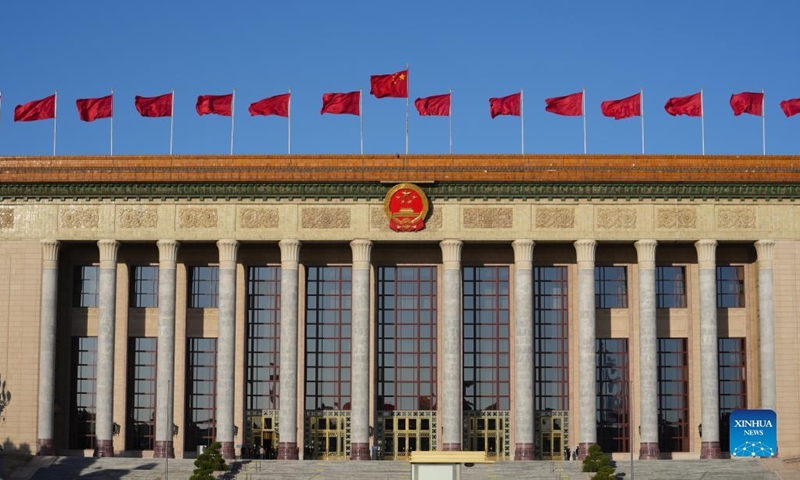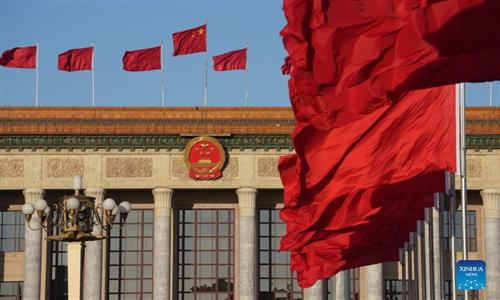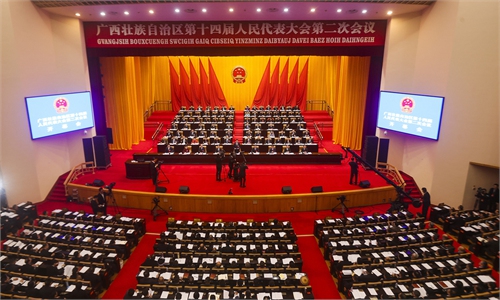China's top legislature starts sessions this week
Meetings pave way for convening NPC in March

A view of the Great Hall of the People in Beijing, capital of China. Photo: Xinhua
The 14th National People's Congress (NPC) Standing Committee started its 8th session in Beijing Monday and the session lasts till Tuesday. One of the important tasks of the session is to prepare for the upcoming meetings of the NPC. The ongoing session will review the NPC Standing Committee work report, draft amendments to the Law on Guarding State Secrets, and report on reviewing the qualifications of individual deputies.
An important task at the NPC Standing Committee session will be to prepare for the second session of the 14th NPC, which will be held in early March.
Lawmakers at the session will deliberate a report on the work of the NPC Standing Committee, a draft agenda for the second session of the 14th NPC, a draft list of people being considered for the presidium and the role of secretary-general, and a draft list of non-voting delegates.
Lawmakers will also review revisions to the Law on Guarding State Secrets, a report on the qualifications of some NPC deputies and personnel-related bills.
Experts told the Global Times that this is a customary move to pave the way for the second session of the 14th NPC, also signaling that China is moving closer to the "two sessions time".
The second session of the 14th NPC is scheduled to convene on March 5, while the second session of the 14th National Committee of the Chinese People's Political Consultative Conference (CPPCC) is set to begin on March 4, according to an official statement released earlier this month.
This year's two sessions will be focused on high-quality development, Zhang Shuhua, director of the institute of political sciences at the Chinese Academy of Social Sciences, told the Global Times on Monday. He noted that deputies to the NPC and members of the CPPCC National Committee will likely focus on discussing how to proceed with the high-quality development of economy and how to further boost confidence in the Chinese economy.
China's first-tier economic heavyweight cities - 26 cities each with a GDP of more than 1 trillion yuan ($139.1 billion) in 2023 - have set their annual GDP targets a notch higher this year, as localities concluded their local two sessions earlier this year.
Zhang Yiwu, a professor from Peking University, also a member of the CPPCC National Committee, told the Global Times that apart from economic development, topics such as stimulating birth rate, improving people's welfare and other livelihood issues will also become focal topics.
Xiong Shuilong, also a member of CPPCC National Committee, proposed that the birth limit be scrapped completely to boost the country's birth rate, and give equal birth support policies to single parents, as well as children born out of wedlock.
The Global Times has noticed that this year's provincial "two sessions" has seen representatives paying more attention than before to livelihood issues such as marriage, childbirth and the protection of minors.
Zhang Yiwu believes that the emerging industries such as AI and other new technologies will also trigger heated discussions at this year's two sessions.
Zhang Jin, a deputy to the 14th National People's Congress and CEO from a robot automatic company in Liaoning, told local media this week that the field of AI has become the main battlefield for China's future strategic competition. Zhang Jin suggested this year's two sessions focus on developing new quality productive forces and building an innovation center in the Northeast China region, where top-notch universities and scientific institutes are located.
He hopes that in future development, disciplines related to artificial intelligence, theoretical modeling, technological innovation, and software and hardware upgrades can be advanced as a whole.



